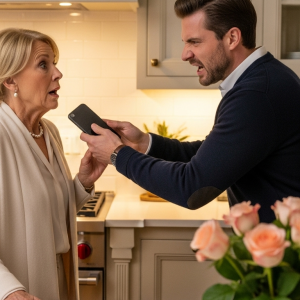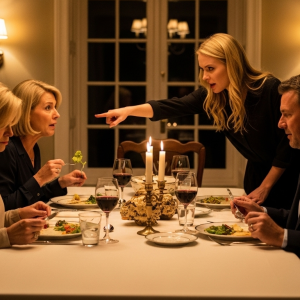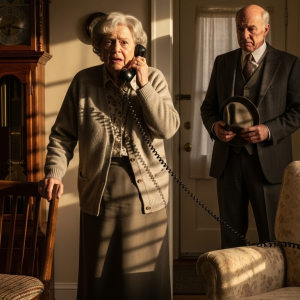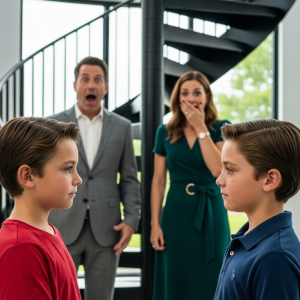My name is Arthur, and at seventy-two, I thought I had earned the right to a quiet life. My wife, Elizabeth, and I had worked hard our entire lives, raised our son, David, and saved for a retirement we envisioned would be filled with leisurely mornings, gardening, and short trips to the coast. But our golden years had been indefinitely postponed by our single greatest joy: our granddaughter, Lily.
When David and his wife, Claire, announced they were having a child, we were overjoyed. But after Lily was born, their careers exploded. Both were lawyers at high-powered firms, and their world became a relentless churn of deadlines, late-night meetings, and business trips. We stepped in to help. At first, it was a few evenings a week. Then, it became the weekdays. Soon, Elizabeth and I were the full-time, unpaid nannies for our five-year-old granddaughter.
Our home, a cozy bungalow we’d intended as our quiet retreat, was transformed into a chaotic daycare. Our mornings were no longer coffee and the newspaper, but spilled cereal, tantrums over clothing, and a frantic rush to get Lily to preschool on time. We adored Lily with every fiber of our beings. She was the light of our lives, but we were exhausted.
David and Claire, meanwhile, lived a parallel existence. They would arrive home after Lily was asleep, kiss her forehead, thank us absently, and then disappear into their home offices. They took our sacrifice for granted, a convenient utility in their busy lives. “Mom, Dad,” David would say, “you’re lifesavers. We don’t know what we’d do without you.” The words, which once warmed us, now sounded hollow, a cheap acknowledgment of our depletion.
The breaking point arrived on a humid Tuesday afternoon. I was playing chase with Lily in the backyard, her laughter a joyful melody. I ran after her around an old oak tree, and then a sharp, stabbing pain, like an icy knife, pierced my chest. My vision blurred, and I staggered, one hand clutching my chest, gasping for air.
Lily stopped running, her laughter dying on her lips. “Grandpa? Are you okay?”
I tried to smile, not wanting to frighten her. “Grandpa just… needs a rest, sweetheart.” But the pain was terrifying. Elizabeth called for an ambulance. At the hospital, after a battery of tests, the doctor sat down with us, his face grim.
“Arthur,” he said, “this was a severe angina attack. A warning shot. Your blood pressure is far too high. Your stress levels are dangerous. You need to make immediate lifestyle changes. Less stress, more rest, no exertion.”
The doctor’s words were a death sentence for our current life. We could not continue like this. My health, and perhaps my life, depended on it. That night, Elizabeth and I had a long, painful conversation. We knew what we had to do. We had to set boundaries. We had to reclaim our lives.
We waited until the weekend to talk to David and Claire, hoping they would be calm and more receptive. We sat in their sleek, minimalist living room, feeling small and out of place amidst their designer furniture.
I cleared my throat, my heart pounding. “David, Claire,” I began. “Your mother and I need to talk to you about something serious.” I explained the trip to the hospital, the doctor’s warning, the absolute necessity for me to reduce my stress.
“So,” Elizabeth concluded gently, “we can’t continue to be Lily’s full-time caregivers anymore. We’re so sorry. We can still help out a day or two a week, but we just can’t do it all.”
We expected understanding, perhaps a flicker of concern for my health. Instead, we were met with a cold silence. Claire was the first to speak, her voice sharp as ice.
“So what do you expect us to do? Quit our jobs?”
David, our son whom we had raised, just stared at us, disbelief hardening into anger. “Do you have any idea what full-time childcare costs in this city? It would bankrupt us. We thought we could count on you.”
“This isn’t about counting on us, David,” I said, my voice trembling with shock. “This is about my health. The doctor said—”
“Doctors always exaggerate,” Claire interrupted, waving a dismissive hand. “You’re family. Family helps each other. You can’t just be selfish and abandon us like this.”
The toxic irony of her words was staggering. They, who had sacrificed five years of our retirement for their careers, were calling us selfish.
“We are not abandoning you,” Elizabeth said, tears welling in her eyes. “We are asking for a balance.”
“No,” David said, standing up, his face a cold mask of indignation. “You’re giving us an ultimatum. It’s either you help us the way we need, or you don’t. And if you choose the latter, then you can find somewhere else to live.”
The threat hung in the air. Our small home, the one we’d lived in for thirty years, was technically owned by David. He had bought it for us years ago as an investment, allowing us to live there rent-free. At the time, it had seemed a generous gesture. Now, we saw it for what it truly was: a leash.
“You don’t mean that, David,” I whispered, hoping to see a flicker of the boy I’d raised.
“I absolutely mean it,” he said. “We need your support. If you can’t provide it, then we can’t provide you with a house. You have one week to think about it.”
We didn’t need a week. We drove home in stunned silence. There was nothing to think about. They had asked us to choose between my health and a roof over our heads. We would not sacrifice another day on the altar of their ambition.
We began to pack. Forty years of a life together, now to be condensed into cardboard boxes. Each item held a memory—photographs, books, the chair Elizabeth had rocked David to sleep in as a baby. It was an agonizing process, a brutal amputation from our own past.
At the end of the week, a small moving truck arrived. David and Claire didn’t come to help. They didn’t even call. As we drove away, I looked back at the house one last time. Lily was standing at the living room window, her small face pressed against the glass, confused and sad. That was the sharpest cut of all. We weren’t just losing our home; we were being cut off from our granddaughter.
We went to Elizabeth’s brother, Joseph. He was a widower who lived alone in their childhood home. When we arrived on his doorstep, exhausted and heartbroken, he welcomed us in without question.
That night, as our boxes were piled in his living room, Elizabeth finally broke down. She told her brother everything—the exhaustion, the broken promises, and David’s cruel ultimatum.
“I can’t believe it, Lizzie,” Joseph said, his face flushing with anger. “He’s your son! How could he treat you and Arthur like hired help, then throw you away when you were no longer useful?”
“The worst part is,” Elizabeth sobbed, “David called me this afternoon. He told me you two had become difficult and demanding, that you decided you wanted to go traveling and abandon him and Lily. He lied to me, Joseph. He created a story to make you the villains.”
That calculated deception hurt more than the eviction. Our son hadn’t just discarded us; he was trying to poison our relationships with the rest of our family.
Joseph was a quiet man, but beneath his calm exterior was a will of steel. “No,” he said, his voice firm with determination. “He’s not getting away with this. Everyone is going to know the truth.”
Joseph took on the role we didn’t have the strength for. He became our messenger. He called their cousins, their aunts, their uncles. He didn’t gossip; he simply stated the facts, calmly and objectively. He told them about my heart condition, the doctor’s warning, our reasonable request for balance, and the cruel response from David and Claire.
The family, who had only heard David’s one-sided story, was shocked. A groundswell of indignation began to build. Our Aunt Barbara, the family’s matriarch, called David. The conversation, as we heard it later, was brief and brutal. She told him his actions were a disgrace to the family name.
The schism had begun.
The call from David came the next evening. He didn’t call to apologize. He called to scream.
“What have you done?” he roared through the phone, I could hear him from across the room. “You’ve turned the whole family against me! You’ve humiliated me and Claire!”
“We only told the truth, David,” I replied, my voice weary.
“Your truth! You’ve ruined us! Fine. Don’t expect another penny from us. You’re on your own.” He hung up. We were now officially disowned.
The following weeks were a painful education in the fragility of life. We had lived assuming David would be our safety net in our old age. Now, that net was gone. Our pensions were meager. Joseph had taken us in, but we couldn’t live off his charity forever.
We started looking for small, affordable apartments, a daunting task in an expensive market. The financial fear was a constant weight. But along with the fear, something unexpected happened. The support from our family poured in.
Cousins started a small fund to help us with a security deposit. Aunt Barbara found a listing in a subsidized senior living complex. For the first time in years, we weren’t alone. We were surrounded by a real family—one built on mutual love and support, not exploitation.
Meanwhile, David and Claire’s world was unraveling. They hired an expensive nanny, who quit after two weeks, citing their demands as “unreasonable.” They tried two more with similar results. Their perfect home became chaotic. Their careers began to suffer as they took time off to deal with childcare emergencies. They were isolated within the family, excluded from Sunday dinners and gatherings.
Joseph helped us find a lawyer, a kind woman specializing in elder rights. She reviewed the documents for our house. “While your names are not on the deed,” she explained, “you don’t have many legal rights to the house itself. However, you may have a claim for five years of unpaid labor.”
We immediately dismissed the idea. We would not sue our son. But the validation of knowing we had rights was a comfort. We were not powerless victims.
With the family’s help, we found a bright, one-bedroom apartment in the senior complex. It was small, but it was ours. We used the money the family had raised for the deposit and the first few months’ rent. For the first time in months, we felt a flicker of hope.
The pressure on David and Claire finally became too much. One evening, they showed up at Joseph’s door, unannounced. They looked tired and defeated.
“We need to talk,” David said, avoiding our eyes.
They offered a clumsy, self-serving apology, blaming stress and work pressure. They said they were wrong and that they wanted us to come back.
“We need you,” Claire said, and for the first time, I heard real desperation in her voice. “Lily misses you terribly. The house is empty without you.”
I looked at Elizabeth, and we shared a silent understanding. The door to that old life was closed forever.
“We are not moving back into that house,” I said firmly. “We will not be your nannies. That relationship is over.”
Panic flared in David’s eyes. “Then what are we supposed to do?”
“You’re going to learn how to be parents,” Elizabeth said, her voice holding no malice, only simple truth. “And we are going to learn how to be grandparents.”
For the next hour, we negotiated the terms of our new relationship. It was not a tearful reunion; it was a business deal. We would not be primary caregivers. We would visit with Lily on weekends, on our schedule. We would take her to the park, to museums. We would be the fun, loving grandparents we had always wanted to be.
They would have to find their own reliable childcare. They would have to adjust their lives to fit their daughter.
Finally, I added one more condition. “You will help us get settled in our new apartment. You will ensure that we never have to worry about rent or bills again. That is the price for the five years we gave you.”
David and Claire, cornered and finally humbled, agreed to every term.
The agreement changed everything. David and Claire helped us get settled in our new place. They set up an automatic monthly payment to cover our living expenses, an unspoken restitution for the years we had lost.
But more importantly, the dynamic shifted. When they came to visit on the weekends to drop off Lily, they treated us with a new respect. They saw us not as employees, but as parents.
Our lives found a new, happy equilibrium. We had our peace during the week and the joy of Lily on the weekends. We had gotten our golden years back. The key to our new apartment didn’t just open a door; it opened our freedom.
One afternoon, as Lily and I were building a castle out of blocks on the living room floor, she looked up at me and said, “Grandpa, I’m glad you’re not tired anymore.”
And in that moment, I knew we had done the right thing. We had taught our son a hard lesson about family, and in return, we had received the most precious thing of all: not a house, but the peace of knowing we were finally respected, free, and loved in the right way.




